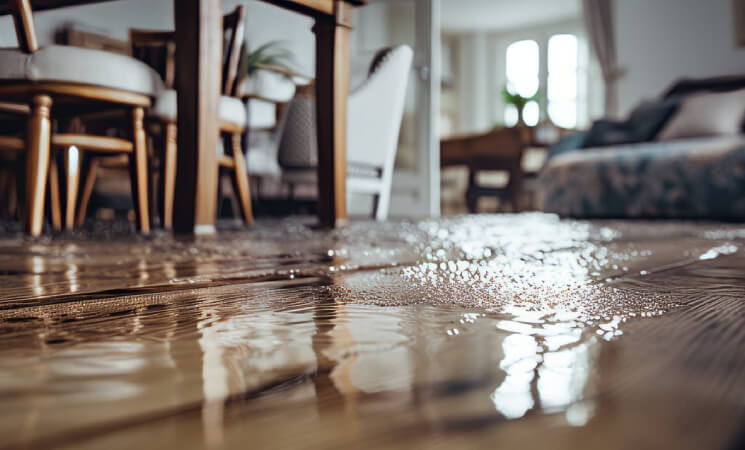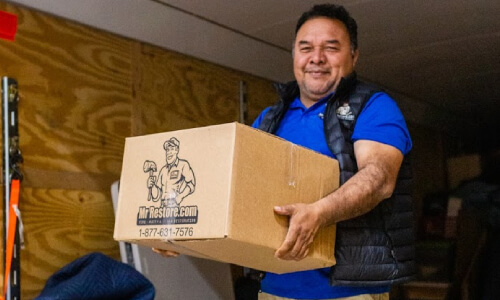Water damage has adverse effects on your health, especially if it belongs to Category C or the black water Category. Commonly caused by pipe bursts, dripping toilets, bathtub overflows, and floods, water damage must be tended to as soon as possible after the occurrence. As soon as the incident takes place, avail our services related to water damage restoration in Dallas, TX. We'll inspect your house, identify the leakage cause, and fix the issue. We'll then begin to clean up and take the necessary steps to extract water from your house. Our team dealing with water damage restoration in Dallas, TX, is an expert in putting everything back in working order again. But the incident can still be troublesome, stressing you out. Not to forget the expenses involved. According to research, water damage restoration in Dallas, TX, totals over a billion dollars every year. So is there any way that you can prevent it altogether? Yes! Our team of water damage restoration in Dallas, TX, has compiled together the most effective preventative measures. Let's take a look.
Proper Drainage
This is the very first step that you should take if you want to avoid water damage restoration in Dallas, TX, in the future. Ensure that the drainage system in your house functions properly so that rainwater doesn't gather and runs off after heavy rains. If it accumulates at any spot and is left untreated, it can weaken the structural foundation of your house, causing cracks and pathways for more water to seep inside.
Gutters
Seeds, leaves, and debris accumulate and clog your gutters as time passes. Get your gutters cleaned periodically so that they continue to function. Avoid doing this, and water will run down against the sides of your house, damaging the siding and, ultimately, the foundation. The same goes for the downspouts. Ensure that they aren't clogged so that water passes through them securely. Downspouts direct water about 5 feet away from the house, so the siding remains intact.
Gutter Guards
Our expert team handling water damage restoration in Dallas, TX, suggests that you should install gutter guards so that your roof gutters don't clog. Thus, water doesn't pool and flows away from your home.
Roof Inspection
This is quite an obvious method to prevent water damage. The roof of your house is exposed to many environmental factors and wears off with time. If you want to prevent future water damage restoration in Dallas, TX, it's a good idea to go get your roof inspected once in a while. If any tile or shingle is loose, missing, or damaged, it can either be repaired or replaced. And by the way, if moss or algae has grown on the roof, then get it cleaned professionally.
Soil Grade
Surround your foundation with soil such that it creates a slope, slightly inclined downwards. Now water will be directed away from your home and won't be able to enter the foundational levels or weaken the structure.
Crawlspace
Does your home have a crawlspace? Keep water away and ensure it doesn't collect underneath the floor. If there is moisture in the air, mold, mildew, and rot can develop. In some cases, insects may even infest the area. So ensure the crawlspace is clean and dry.
Trees and Vegetation
Our team dealing with water damage restoration in Dallas, TX, advises taking particular care when growing trees and other vegetation. Indeed, greenery improves landscapes and increases curb appeal. But make sure there are no shrubs or trees near your plumbing system. Also, if the existing ones have grown bigger, removing them may be appropriate. Certain plants and trees, like silver maples and weeping willows, grow a huge root system underneath the surface. And if you don't control this, there is a very good chance that roots will grow through your drainage field, restoration pipes, and tanks, blocking water flow. Our expert team of water damage restoration in Dallas, TX, suggests that if you're planting trees, you should do so at least 20 feet away from the drainage system. When space is an issue, stick to smaller species, but then also you'll have to maintain a distance of 10 feet away from your water system.
Sprinklers
Examine your sprinkles and ensure that no water has collected near the foundation. Live in colder areas where temperatures fall below freezing points? Check your outside faucets and drain them out completely before winter strikes. This will ensure that water freezes inside the pipes.
Concrete
Concrete is highly susceptible to cracks, but you should still do whatever you can about them. Leaving them untreated will only allow them to grow bigger and spread throughout. The situation will likely be worse if you live in colder areas where water freezes in the winter. If you notice any cracks in concrete, get them inspected so that the team can ensure there aren't any underlying issues that could be a concern. Most cracks smaller than 0.25 inches can be filled up with concrete caulk. For larger cracks, the team would use the concrete patch.
Water Main
Where is the water main in your house located? Our expert team dealing with water damage restoration in Dallas, TX, has often come across many homeowners who don't know the location. If you know where the water main is, you can easily turn it off quickly as soon as you suspect a leakage and prevent significant damage.
Appliances
Appliances are one of the most common causes of water damage in Dallas, TX. If they have crossed the end of their useful life, get them replaced instantly. Avoid using them if they are malfunctioning or leaking until you get the issue fixed.
Drain Pans
Drain pans cannot prevent bigger leakages. However, when the leakages are small, they can collect dripping water and prevent damage. Plus, you learn of the issue sooner and can then get it fixed in a timely manner. We offer water damage restoration in Dallas, TX, and other surrounding areas. Visit our website for more information. www.mrrestore.com






